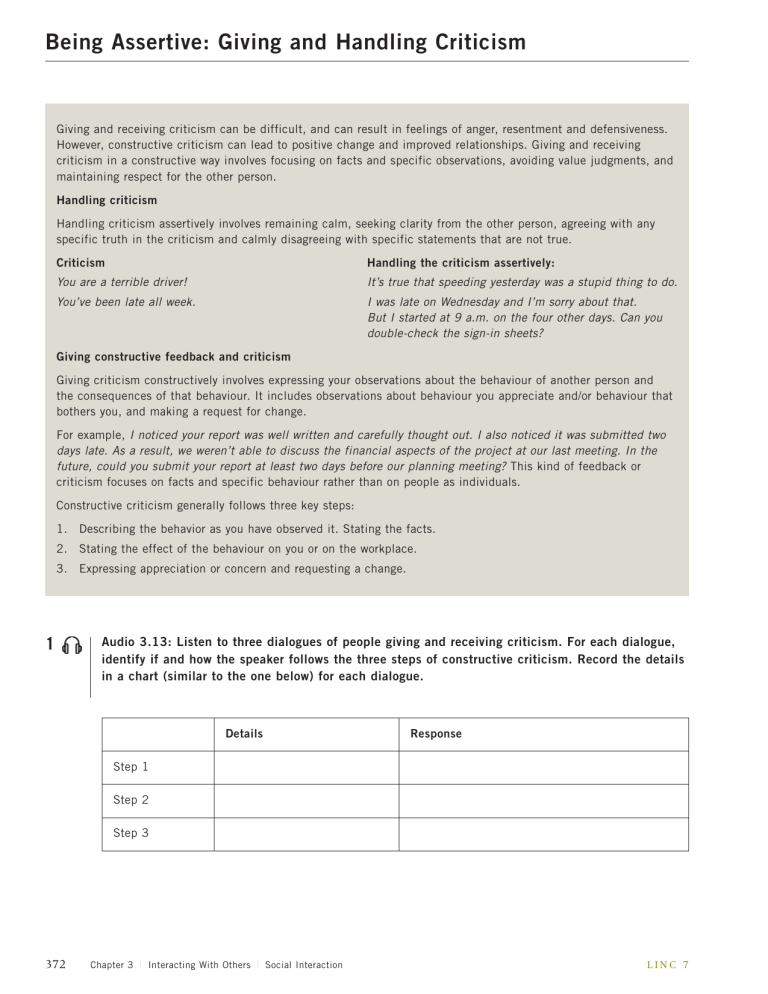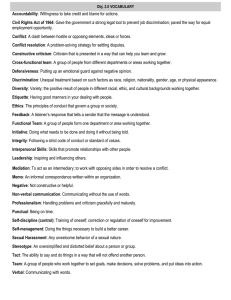
Being Assertive: Giving and Handling Criticism Giving and receiving criticism can be difficult, and can result in feelings of anger, resentment and defensiveness. However, constructive criticism can lead to positive change and improved relationships. Giving and receiving criticism in a constructive way involves focusing on facts and specific observations, avoiding value judgments, and maintaining respect for the other person. Handling criticism Handling criticism assertively involves remaining calm, seeking clarity from the other person, agreeing with any specific truth in the criticism and calmly disagreeing with specific statements that are not true. Criticism Handling the criticism assertively: You are a terrible driver! It’s true that speeding yesterday was a stupid thing to do. You’ve been late all week. I was late on Wednesday and I’m sorry about that. But I started at 9 a.m. on the four other days. Can you double-check the sign-in sheets? Giving constructive feedback and criticism Giving criticism constructively involves expressing your observations about the behaviour of another person and the consequences of that behaviour. It includes observations about behaviour you appreciate and/or behaviour that bothers you, and making a request for change. For example, I noticed your report was well written and carefully thought out. I also noticed it was submitted two days late. As a result, we weren’t able to discuss the financial aspects of the project at our last meeting. In the future, could you submit your report at least two days before our planning meeting? This kind of feedback or criticism focuses on facts and specific behaviour rather than on people as individuals. Constructive criticism generally follows three key steps: 1. Describing the behavior as you have observed it. Stating the facts. 2. Stating the effect of the behaviour on you or on the workplace. 3. Expressing appreciation or concern and requesting a change. 1 Audio 3.13: Listen to three dialogues of people giving and receiving criticism. For each dialogue, identify if and how the speaker follows the three steps of constructive criticism. Record the details in a chart (similar to the one below) for each dialogue. Details Response Step 1 Step 2 Step 3 372 Chapter 3 | Interacting With Others | Social Interaction LINC 7 Being Assertive: Giving and Handling Criticism (Cont.) Here are some more tips for giving feedback about another person’s behaviour: • Don’t generalize by using the words “always” and “never” (e.g., You never help me when I ask for help; You always interrupt me when I’m talking). • Don’t make judgments or accusations (e.g., You are a lazy person; You’re spending too much money). • Keep the focus on specific observations of behavior and state the consequences of the behaviour: Last month I noticed that you spent $300 on clothes, and now we have a credit card debt. I hear you mowing your lawn sometimes very early in the morning. It wakes my children up and they don’t get enough sleep. I really don’t like it when you raise your voice. 2 Reword the following statements so that they focus on an observation of behavior and the consequences of that behaviour. 1. You never listen to my ideas. 2. Your work is sloppy. 3. You are so disorganized. 4. You never meet your deadlines. 5. You always criticize me in front of others. 6. You didn’t do your share of work on the project. 3 For each situation below, prepare an assertive response. Situation 1 Your manager is angry because he believes, wrongly, that you are responsible for a serious mistake in the department. What do you say when your manager accuses you of making this mistake? Situation 2 You frequently take your elderly mother to a walk-in clinic for appointments. You have noticed that the nurse speaks rudely to your mother and is rough with her when she gives her injections and takes her blood pressure. As a result, your mother gets very anxious before each visit. Speak to the nurse. LINC 7 Chapter 3 | Interacting With Others | Social Interaction 373 Being Assertive: Giving and Handling Criticism (Cont.) 4 With a partner, role-play the following scenarios. When you give feedback, be sure to: • Describe your observations of the behavior with “I” statements • Describe how the behaviour affects you or the workplace • Express appreciation or concern and request a specific change in behaviour 5 374 Co-worker A Co-worker B Your co-worker recently had a negative performance evaluation. He is feeling resentful toward the manager and is constantly making negative comments to you about the manager and the company. You like the manager and are happy with your job at the company. Give your co-worker some constructive criticism. You recently had a negative performance evaluation. You feel your manager was unfair and you are feeling angry and resentful. You have been voicing your negative feelings about the manager and the company to your co-worker. Respond to criticism from your co-worker. Co-worker A Co-worker B You are getting married in two months and you have a lot to do to plan a big wedding. You are not too busy at work these days, so you have been spending time on the phone calling various vendors to make your wedding plans. Respond to criticism from your co-worker. You work in a cubicle beside a co-worker who is getting married. She spends a lot of time everyday on the telephone planning her wedding and discussing her plans with friends. You are tired of listening to these conversations and they are affecting your ability to concentrate on your work. Give your co-worker constructive criticism. Co-worker A Co-worker B You are part of a team of that is planning a project. During team meetings, one member of your team is consistently negative toward your ideas. In one meeting, she responded to a suggestion from you by saying, Well, that’s a stupid idea. Give your team member some constructive criticism. You are part of a team that is planning a project. You are enjoying the project and feel you work well with the team members. You have a lot of ideas and you feel your team members are receptive toward them. You have more experience than your team members. Respond to criticism from a team member. Employee Manager You prepared the monthly report for your manager as usual. You were a little late this month because your manager had given you several other responsibilities. Respond to criticism from your manager. Your employee submitted a monthly report that contained some factual and typographical errors. You had to spend time redoing the report. Give your employee some constructive criticism. With a partner, think of a workplace or personal situation where you might want to give constructive feedback. Prepare and role-play a dialogue. Chapter 3 | Interacting With Others | Social Interaction LINC 7



